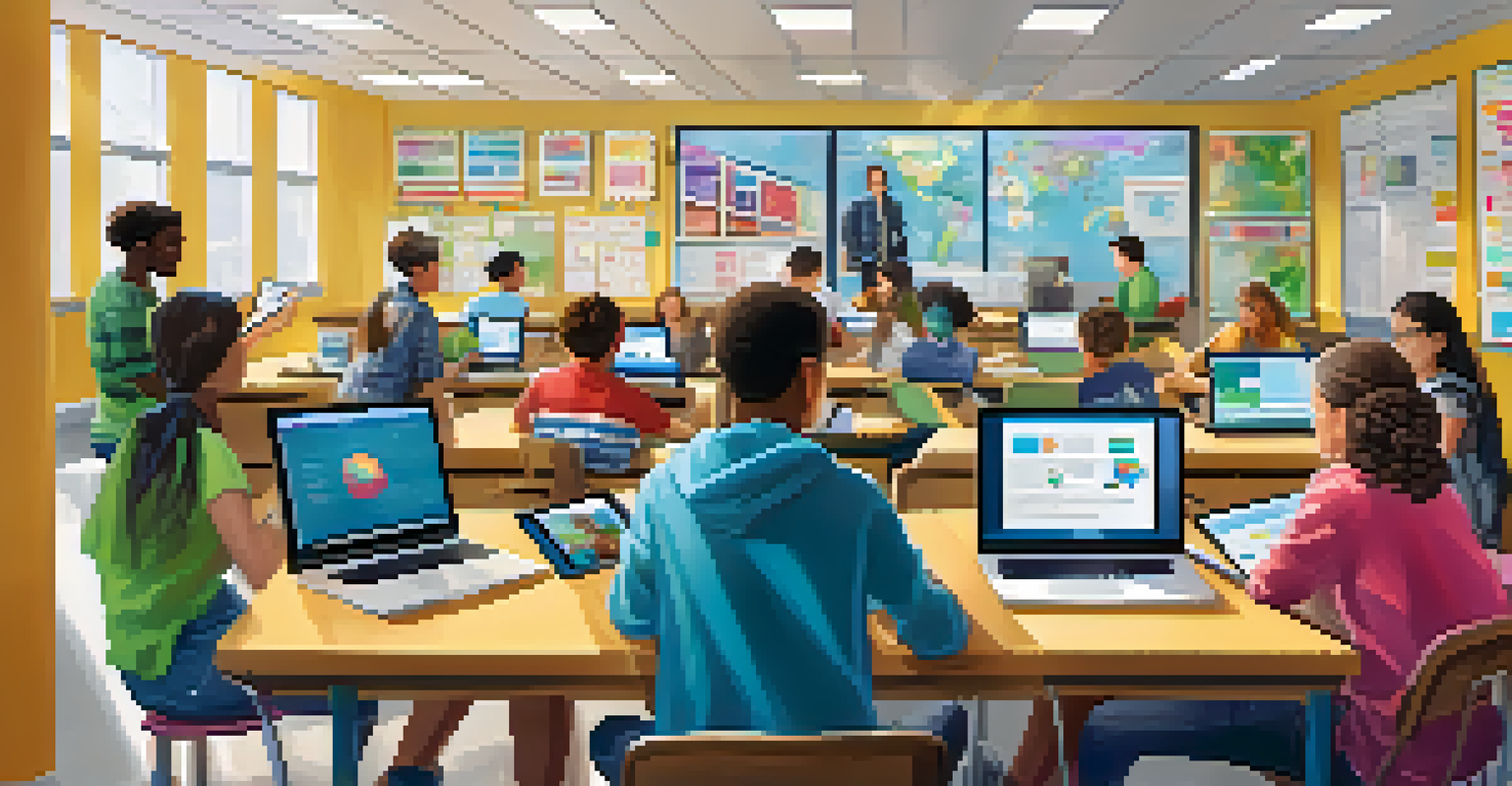Mobile Learning and Digital Literacy: Preparing Students for Success

Understanding Mobile Learning in Today's Education Landscape
Mobile learning, often referred to as m-learning, is an educational approach that utilizes mobile devices to facilitate learning. This method empowers students to learn anytime and anywhere, blurring the lines between classroom and real-world experiences. With smartphones and tablets becoming ubiquitous, integrating mobile learning into education is not just innovative; it's essential.
Mobile learning is not just about technology; it's about creating a learning environment that is flexible, engaging, and accessible to all students.
Imagine a student studying biology while observing flora and fauna in a park, all while accessing interactive apps that enhance their understanding. This flexibility allows learners to engage with content in ways that traditional methods may not. The ability to instantly access information and resources fosters a deeper connection to the subject matter.
As education continues to evolve, mobile learning serves as a bridge to connect students with the skills they need for future success. It prepares them not only for academic challenges but also for a workforce that increasingly values digital competence.
The Role of Digital Literacy in Student Success
Digital literacy goes beyond knowing how to use devices; it encompasses the ability to critically evaluate online information and communicate effectively in digital spaces. In our fast-paced world, students must navigate an overwhelming amount of information, making digital literacy a cornerstone of their education. This skill set is crucial for academic performance and lifelong learning.

For instance, when students research online, they need to discern credible sources from misinformation. This skill not only aids in their current studies but also prepares them for future challenges in a complex digital environment. Digital literacy equips students with the tools to thrive in various scenarios, from school projects to professional endeavors.
Mobile Learning Enhances Flexibility
Mobile learning empowers students to learn anytime and anywhere, merging classroom education with real-world experiences.
Ultimately, fostering digital literacy ensures that students are not just consumers of information but also informed creators. This active engagement with digital content cultivates critical thinking and problem-solving skills, essential for success in any field.
Benefits of Integrating Mobile Learning and Digital Literacy
The combination of mobile learning and digital literacy creates a powerful learning environment that enhances student engagement. When students can access educational content on their devices, they often feel more motivated and involved in their learning process. This interactivity can lead to improved retention and understanding of complex topics.
In a world where information is abundant, digital literacy is the key to unlocking a student's potential to navigate and create in the digital landscape.
Moreover, mobile learning encourages collaborative opportunities among peers. Students can work together on projects using shared apps and platforms, fostering teamwork and communication skills. This social aspect not only makes learning more enjoyable but also mirrors real-world scenarios where collaboration is key.
As educators embrace this integration, they can tailor lessons to meet diverse learning styles. By utilizing various mobile tools, teachers can create a more inclusive classroom that caters to individual needs, paving the way for greater academic success.
Challenges in Implementing Mobile Learning Solutions
While mobile learning offers numerous benefits, it also presents challenges that educators must navigate. One significant issue is the digital divide; not all students have equal access to devices or reliable internet connections. This disparity can hinder the effectiveness of mobile learning initiatives, leaving some students at a disadvantage.
Additionally, there is the challenge of ensuring that students use their devices for educational purposes. Distractions from social media and games can undermine the learning experience. Educators must find ways to guide students in using technology responsibly and productively.
Digital Literacy is Essential
Digital literacy equips students to critically evaluate online information and communicate effectively, which is vital for academic and future success.
Addressing these challenges requires a strategic approach, including providing resources and support for students who may lack access. Schools can also implement clear guidelines and expectations for device usage, helping to create a focused learning environment.
Essential Tools for Mobile Learning and Digital Literacy
To make the most of mobile learning, educators should leverage various tools that enhance digital literacy. Applications like Google Classroom and Quizlet allow for seamless collaboration and interactive learning experiences. These platforms not only facilitate communication but also provide valuable resources for both teachers and students.
Moreover, educational apps that focus on critical thinking and problem-solving skills can significantly enhance digital literacy. For example, coding platforms like Code.org help students develop technical skills while fostering creativity and logical reasoning.
By incorporating these tools into the curriculum, educators can create a rich learning environment that prepares students for the digital age. The right resources can inspire students to engage actively with their education and develop essential skills for their futures.
The Future of Mobile Learning and Digital Literacy
As technology continues to advance, the future of mobile learning and digital literacy looks promising. Innovations such as augmented reality (AR) and artificial intelligence (AI) are set to transform how students learn and interact with content. These technologies can provide personalized learning experiences, catering to individual needs and preferences.
Imagine a classroom where students can explore historical sites through AR or receive real-time feedback from AI tools while practicing a new language. Such experiences can make learning more immersive and engaging, sparking curiosity and encouraging exploration.
Integration Boosts Engagement
Combining mobile learning with digital literacy fosters student engagement and collaboration, creating a more inclusive and effective learning environment.
Ultimately, the future will likely see a more integrated approach to education that embraces mobile learning and digital literacy. This evolution will empower students to become skilled, adaptable learners who are ready to face the challenges of a rapidly changing world.
Strategies for Educators to Enhance Mobile Learning
To effectively implement mobile learning, educators can adopt various strategies that promote engagement and facilitate learning. One effective approach is to encourage project-based learning, where students use their devices to research, create, and present their findings. This hands-on experience not only enhances understanding but also fosters collaboration.
Additionally, providing professional development for teachers can significantly improve the integration of mobile learning. Training sessions that focus on the latest tools and techniques can empower educators to make the most of mobile technology in their classrooms. This support is essential for creating a culture of innovation and adaptability.

Lastly, involving students in the decision-making process regarding mobile tools can increase buy-in and motivation. By allowing students to suggest apps or platforms they find useful, educators can create a more engaging learning environment that resonates with their interests and needs.